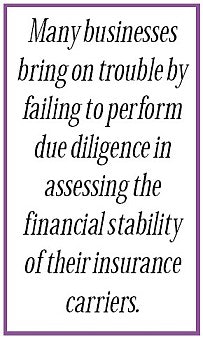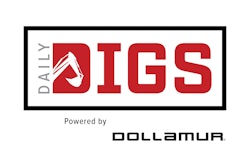Pursuing Financial Information on Insurance Carriers

If a fire destroys your fitness club tonight, will you be left with nothing but ashes?
Like most business owners, you expect rapid compensation after fire, wind damage or burglary. Unfortunately, your insurance company may have other ideas. After receiving your claim, your carrier may: • Weasel out of paying by citing contract loopholes. • Deny coverage for many items until you prove ownership and loss. • Drag the procedure out for months before cutting you a check.
Whatever the tactic, the result is the same: costly delays that not only keep you from quickly relaunching your business, but can even trigger bankruptcy.
Here's some good news: You can take action now to smooth the transition should disaster strike. Indeed, you have a plethora of resources at your disposal.
Daniel C. Free is president and general counsel of Insurance Audit & Inspection Company, an Indianapolis-based consulting firm, and president of the Society of Risk Management Consultants. According to Free, many businesses bring on trouble by failing to perform due diligence in assessing the financial stability of their carriers. "If you have a policy with a weak carrier, your claim may not be settled in a timely manner," he says.
It's even worse if your insurance company goes belly-up, according to Free. "If your carrier becomes insolvent," he warns, "you may have to rely on your state's guarantee trust fund, which is financed with money paid by insurance companies licensed in your state." When an insurance company goes under, claimants turn to the trust fund for a partial recovery of the amount they would have gotten from their carrier. "Partial" is the operative word - claimants are limited to a certain dollar amount. Notes Free, "In brief, you will wait a long time for a partial recovery."
So the risk in choosing the wrong insurance company is high. Most business owners just pick a carrier with a name that "sounds solid," pay their premiums, and hope for the best. You can do better than that by utilizing information from any of six major ratings services that, while they don't measure how quickly carriers respond to customer claims, do offer assessments of the financial health of insurance carriers:
The oldest of the ratings outfits, A.M. Best employs analysts who make on-site visits and report on 3,000 property and casualty companies and nearly 1,600 life and health companies. Carrier ratings are available for $4.95 and can be accessed at www.ambest.com/ bestline. An in-depth Best's Company Report costs $19.95. Reports are Emailed or faxed immediately.
Demotech provides financial stability ratings on 2,500 carriers, which it develops from published financial statements rather than site visits. Ratings information can be ordered by calling 800/3547207 or by visiting www.demotech.com.
After rating bond issues for decades, Moody's Investors Service started assessing the financial strength of 200 property and casualty insurance companies in 1986. You can get a free rating on your insurance company by calling the ratings desk at 212/553-0377, or by visiting www. moodys.com/insurance.
While Moody's does not sell in-depth reports on individual companies, you can find one-page reports on individual insurance companies in Moody's Insurance Credit Opinions, a book available at many public libraries.
Like Moody's, Duff & Phelps Credit Rating Co. (DCR) got its start in financial analysis. It now rates more than 400 companies in the life and health, and property and casualty areas. If DCR covers your insurance carrier, you can obtain a free rating by calling the ratings desk at 312/368-3198. For $25, you can receive a more in-depth report. DCR's Web site is www.dcrco.com.
Through its insurer financial strength ratings, Standard & Poor's Rating Services provides its opinion about the overall financial health of 1,500 property and casualty insurers. These ratings are available on a complimentary basis at www.standardandpoors.com/ ratings. Ratings information can also be obtained by calling the Ratings Help Desk at 212/438-2400.
A spinoff from a newsletter, Weiss Ratings rates 1,500 life, health and annuity insurance providers, as well as 2,200 property and casualty insurance companies. Weiss claims that its ratings are more conservative than those of the competition. You can get a rating on an insurance company for $15 by calling 800/289-9222. The company will also mail a one-page review for $25 or an 18-page report for $45. The "Weiss Watchdog Service," which notifies you of changes in ratings automatically, costs $12 per quarter.
Free, who favors A.M. Best for its longevity and specialization, recommends looking up a carrier in all of the ratings services, rather than just one. Each service uses a different formula for assessing financial stability, so one may catch a problem that the others miss. Indeed, if you see a big discrepancy in the ratings, find out what's causing it.
You can also ask your state's insurance department for reports. All insurance companies certified to provide insurance in a state have to file an annual financial report with the state insurance department. (If your carrier is not licensed to do business in your state, you will not have access to the funds in the state guarantee fund if the insurance company goes bust.)
Just as important, many states provide reports on how many complaints have been filed against the carrier. Often, states calculate "complaint ratios." These figures are calculated by dividing the number of complaints by the number of policies outstanding. The higher the ratio, the greater the problem. Complaints can also be clues to solvency problems. For example, if a large number of complaints have been filed because a company was late paying claims, it can mean the firm is having financial difficulties.
Keep in mind that some states maintain more comprehensive records than others. To find the contact information for the insurance department in your state, visit the following Web page hosted by Insurance News Network: www.insure.com/states. This site is also an excellent place to get answers to insurance questions in general.
Given the many minefields along the path to risk management, it's clear that the prudent club owner must do more than pick an insurance company with a household name. Probing deeper into the financial stability of insurance carriers can give you a little more stability when problems arise.




































